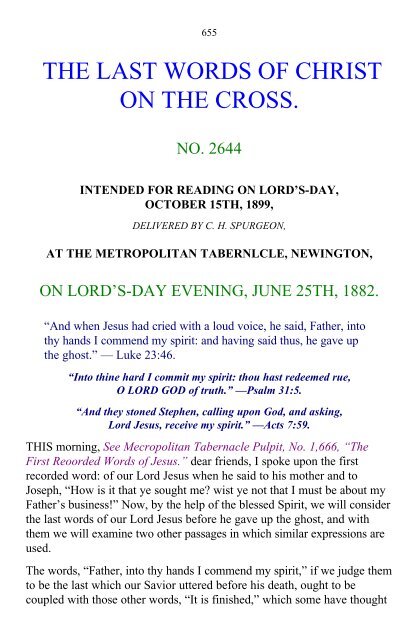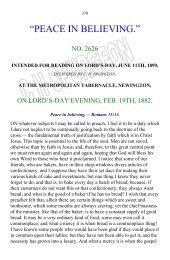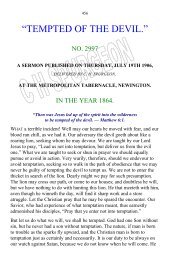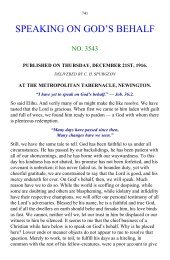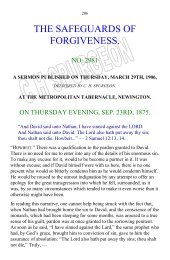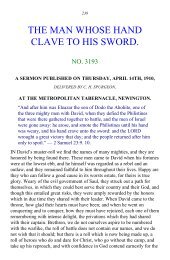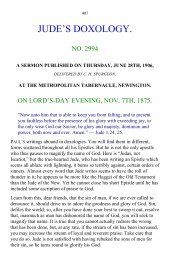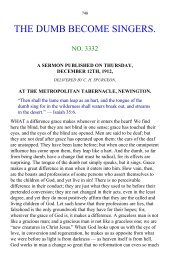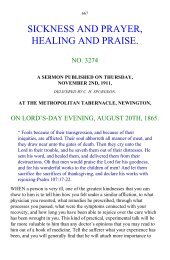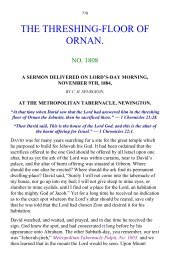THE LAST WORDS OF CHRIST ON THE CROSS. - APIBS Home
THE LAST WORDS OF CHRIST ON THE CROSS. - APIBS Home
THE LAST WORDS OF CHRIST ON THE CROSS. - APIBS Home
Create successful ePaper yourself
Turn your PDF publications into a flip-book with our unique Google optimized e-Paper software.
655<br />
<strong>THE</strong> <strong>LAST</strong> <strong>WORDS</strong> <strong>OF</strong> <strong>CHRIST</strong><br />
<strong>ON</strong> <strong>THE</strong> <strong>CROSS</strong>.<br />
NO. 2644<br />
INTENDED FOR READING <strong>ON</strong> LORD’S-DAY,<br />
OCTOBER 15TH, 1899,<br />
DELIVERED BY C. H. SPURGE<strong>ON</strong>,<br />
AT <strong>THE</strong> METROPOLITAN TABERNLCLE, NEWINGT<strong>ON</strong>,<br />
<strong>ON</strong> LORD’S-DAY EVENING, JUNE 25TH, 1882.<br />
“And when Jesus had cried with a loud voice, he said, Father, into<br />
thy hands I commend my spirit: and having said thus, he gave up<br />
the ghost.” — Luke 23:46.<br />
“Into thine hard I commit my spirit: thou hast redeemed rue,<br />
O LORD GOD of truth.” —Psalm 31:5.<br />
“And they stoned Stephen, calling upon God, and asking,<br />
Lord Jesus, receive my spirit.” —Acts 7:59.<br />
THIS morning, See Mecropolitan Tabernacle Pulpit, No. 1,666, “The<br />
First Reoorded Words of Jesus.” dear friends, I spoke upon the first<br />
recorded word: of our Lord Jesus when he said to his mother and to<br />
Joseph, “How is it that ye sought me? wist ye not that I must be about my<br />
Father’s business!” Now, by the help of the blessed Spirit, we will consider<br />
the last words of our Lord Jesus before he gave up the ghost, and with<br />
them we will examine two other passages in which similar expressions are<br />
used.<br />
The words, “Father, into thy hands I commend my spirit,” if we judge them<br />
to be the last which our Savior uttered before his death, ought to be<br />
coupled with those other words, “It is finished,” which some have thought
656<br />
were actually the last he used. I think it was not so; but, anyhow, these<br />
utterances must have followed each other very quickly, and we may blend<br />
them together, and then we shall see how very similar they are to his first<br />
words as we explained them this morning. There is the cry, “It is finished,”<br />
which you may read in connection with our Authorized Version: “Wist ye<br />
not that I must be about my Father’s business?” That business was all<br />
finished; he had been about it all his life, and now that he had come to the<br />
end of his days, there was nothing left undone, and he could say to his<br />
Father, “I have finished the work which thou gavest me to do.” Then if you<br />
take the other utterance of our Lord on the cross, “Father, into thy hands I<br />
commend my spirit,” see how well it agrees with the other reading of our<br />
morning text, “Wist ye not that I must be in my Father’s house?” Jesus is<br />
putting himself into the Father’s hands because he had always desired to be<br />
there, in the Father’s house with the Father; and now be is committing his<br />
spirit, as a sacred trust, into the Father’s hands that he may depart to be<br />
with the Father, to abide in his house, and go no more out for ever.<br />
Christ’s life is all of a piece, just as the alpha and the omega are letters of<br />
the same alphabet. You do not find him one thing at the first, another thing<br />
afterwards, and a third thing still later; but he is “Jesus Christ; the same<br />
yesterday, and to-day, and for ever.” There is a wondrous similarity about<br />
everything that Christ said and did. You never need write the name “Jesus”<br />
under any one of his sayings, as you have to put the names of human<br />
writers under their sayings, for there is no mistaking any sentence that he<br />
has uttered.<br />
If there is anything recorded as having been done by Christ, a believing<br />
child can judge whether it is authentic or not. Those miserable false gospels<br />
that were brought out did very little if any mischief, because nobody, with<br />
any true spiritual discernment, was ever duped into believing them to be<br />
genuine. It is possible to manufacture a spurious coin which will, for a<br />
time, pass for a good one; but it is not possible to make even a passable<br />
imitation of what Jesus Christ has said and done. Everything about Christ is<br />
like himself; there is a Christlikeness about it which cannot be mistaken.<br />
This morning, for instance, when I preached about the Holy Child jesus, I<br />
am sure you must have felt that there was never such another child as he<br />
was; and in his death he was as unique as in his birth, and childhood, and<br />
life. There was never another who died as he did, and there was never<br />
another who lived altogether as he did. Our Lord Jesus Christ stands by<br />
himself; some of us try to imitate him, but how feebly do we follow in his
657<br />
steps! The Christ of God still standeth by himself, and there is no possible<br />
rival to him.<br />
I have already intimated to you that I am going to have three texts for my<br />
sermon; but when I have spoken upon all three of them, you will see that<br />
they are so much alike that I might have been content with one of them.<br />
I. I invite you first to consider OUR SAVIOR’S <strong>WORDS</strong> JUST BEFORE HIS<br />
DEATH: “Father, into thy hands I commend my spirit.”<br />
Here observe, first, how Christ lives and passes away in the atmosphere of<br />
the Word of Cod. Christ was a grand original thinker, and he might always<br />
have given us words of his own. He never lacked suitable language, for<br />
“never man spake like this Man.” Yet you must have noticed how<br />
continually he quoted Scripture; the great majority of his expressions may<br />
be traced to the Old Testament. Even where they are not exact quotations,<br />
his wards drop into Scriptural shape and form. You can see that the Bible<br />
has been his one Book. He is evidently familiar with it from the first page<br />
to the last, and not with its letter only, but with the innermost soul of<br />
it”most secret sense; and, therefore, when dying, it seemed but natural for<br />
him to use a passage from a Psalm of David as his expiring words. In his<br />
death, he was not driven beyond the power of quiet thought, he was not<br />
unconscious, he did not die of weakness, he was strong even while he was<br />
dying. It is true that he said,”I thirst;”but, after he had been a little<br />
refreshed, he cried with a loud voice, as only a strong man could,”It is<br />
finished.”And now, ere he bows his head in the silence of death, he utters<br />
his final words, “Father, into thy hands I commend my spirit.”Our Lord<br />
might, l say again, have made an original speech as his dying declaration;<br />
his mind was clear, and calm, and undisturbed; in fact, he was perfectly<br />
happy, for he had said,”It is finished.”So his sufferings were over, and he<br />
was already beginning to enjoy a taste of the sweets of victory; yet, with all<br />
that clearness of mind, and freshness of intellect, and fluency of words that<br />
might have been possible to him, he did not invent a new sentence, but he<br />
went to the Book of Psalms, and took from the Holy Spirit this expre<br />
sion,”Into thy hands I commit my spirit.”<br />
How instructive to us is this great truth that the Incarnate Word lived on<br />
the Inspired Word! It was food to him, as it is to us; and, brothers and<br />
sisters, if Christ thus lived upon the Word of God, should not you and I do<br />
the same! He, in some respects, did not, need this Book as much as we do.<br />
The Spirit of God rested upon him without measure, yet he loved the
658<br />
Scripture, and he went to it, and studied it, and used its expressions<br />
continually. Oh, that, you and I might get into the very heart of the Word<br />
of God, and get that Word into ourselves! As I have seen the silkworm eat<br />
into the leaf, and consume it, so ought we to do with the Word of the<br />
Lord; not crawl ever its surface, but eat right into it till we have taken it<br />
into our inmost parts. It is idle merely to let the eye glance over the words,<br />
or to recollect the poetical expressions, or the historic facts; but it is<br />
blessed to eat into the verysoul of the Bible until, at last, you come to talk<br />
in Scriptural language, and your very style is fashioned upon Scripture<br />
models, and, what is better still, your spirit is flavoured with the words of<br />
the Lord. I would quote John Bunyan as an instance of what I mean. Ideal<br />
anything of his, and you will see that it is almost like reading the Bible<br />
itself. He had studied our Authorized Version, which will never be<br />
bettered, as I judge, till Christ shall come; he had read it till his very soul<br />
was saturated with Scripture; and, though his writings are charmingly full<br />
of poetry, yet he cannot give us his Pilgrim’s Progress — that sweetest of<br />
all prose poems — without continually making us feel and say, “Why, this<br />
man is a living Bible!” Prick him anywhere; his blood is Bibline, the very<br />
essence of the Bible flows from him. He cannot speak without quoting a<br />
text, for his very soul is full of the Word of God. I commend his example<br />
to you, beloved, and, still more, the example of our Lord Jesus. If the<br />
Spirit of God be in you, he will make you. love the Word of God; and, if<br />
any of you imagine that the Spirit of God will lead you to dispense with the<br />
Bible, you are under the influence of another spirit which is not the Spirit<br />
of God at all. I trust that the Holy Spirit vill endear to you every page of<br />
this Divine Record, so that you will feed upon it yourselves, and afterwards<br />
speak it out to others. I think it is well worthy of your constant<br />
remembrance that, even in death, our blessed Master showed the ruling<br />
passion of his spirit, so that his last words were a quotation from Scripture.<br />
Now notice, secondly, that our Lord, in the moment of his death,<br />
recognized a personal God: “Father, into thy hands I commend my spirit.”<br />
God is to some men an unknown God. “There may be a God,” so they say,<br />
but they get no nearer the truth than that. “All things are God,” says<br />
another. “We cannot be sure that there is a God,” say others, “and<br />
therefore it is no use our pretending to believe in him, and so to he,<br />
possibly, influenced by a supposition.” Some people say, “Oh, certainly,<br />
there is a God, but he is very far off! He does not come near to us, and we<br />
cannot imagine that he will interfere in our affairs.” Ah! but our blessed
659<br />
Lord Jesus Christ believed in no such impersonal, pantheistic, dreamy, faroff<br />
God; but in One to whom he said, “Father, into thy hands I commend<br />
my spirit.” His language shows that he realized the personality of God as<br />
much as I should recognize the personality of a banker if I said to him,<br />
“Sir, I commit that money into your hands.” I know that I should not say<br />
such a thing as that to a mere dummy, or to an abstract something or<br />
nothing; but to a living man I should say it, and I should say it only to a<br />
living man. So, beloved, men do not commit their souls into the keeping of<br />
impalpable nothings; they do not, in death, smile as they resign themselves<br />
to the infinite unknown, the cloudy Father of everything, who may himself<br />
be nothing or everything. No, no; we only trust what we know; and so<br />
Jesus knew the Father, and knew him to be a real Person having hands,<br />
into those hands he commended his departing spirit. I am not now speaking<br />
materially, mark you, as though God had hands like ours; but he is an<br />
actual Being, who has powers of action, who is able to deal with men as he<br />
pleases, and who is willing to take possession of their spirits, and to protect<br />
them for ever and ever. jesus speaks like one who believed that; and I pray<br />
that, both in life and in death, you and I may ever deal with God in the<br />
same way. We have far too much fiction in religion, and a religion of<br />
fiction will bring only fictitious comfort in the dying hour. Come to solid<br />
facts, man. Is God as real to thee as thou art to thyself? Come now; dost<br />
thou speak with him “as a man speaketh unto his friend”? Canst thou trust<br />
him, and rely upon him as thou dost trust and rely upon the partner of thy<br />
bosom? If thy God be unreal, thy religion is unreal. If thy God be a dream,<br />
thy hope will be a dream; and woe be unto thee when thou shalt wake up<br />
out of it! It was not so that Jesus trusted. “Father,” said he, “into thy hands<br />
I commend my spirit.”<br />
But, thirdly, here is a better point still. Observe how Jesus Christ here<br />
brings out the Fatherhood of God. The Psalm from which he quoted did<br />
not say, “Father.” David did not get as far as that in words, though in spirit<br />
he often did; but Jesus had the right to alter the Psalmist’s words. He can<br />
improve on Scripture, though you and I cannot. He did not say, “O God,<br />
into thine hand I commit my spirit;” but he said, “Father.” Oh, that sweet<br />
word! That was the gem of our thought, this morning, that Jesus said,<br />
“Wist ye not that I must be at my Father’s,— that I must be in my Father’s<br />
house!” Oh, yes! the Holy Child knew that he was specially, and in a<br />
peculiar sense, the Son of the Highest; and therefore he said, “My Father;”<br />
and, in dying, his expiring heart was buoyed up and comforted with the
660<br />
thought that God was his Father. It was because he said that God was his<br />
Father that they put him to death, yet he still stood to it even in his dying<br />
hour, and said, “Father, into thy hands I commend my spirit.”<br />
What a blessed thing it is for us also, my brethren, to die conscious that we<br />
are sons of God! Oh, how sweet, in life and in death, to feel in our soul the<br />
spirit of adoption whereby we cry, “Abba, Father”! In such a case as<br />
that,—<br />
It is not death to die.<br />
Quoting the Savior’s words, “It is finished,” and relying upon his Father<br />
and our Father, we may go even into the jaws of death without the<br />
“quivering lips” of watch we sang just now. Joyful, with all the strength we<br />
have, our lips may confidently sing, challenging death and the grave to<br />
silence our ever-rising and swelling music. O my Father, my Father, if I am<br />
in thy hands, I may die without fear!<br />
There is another thought, however, which is perhaps the chief one of all.<br />
From this passage, we learn that our Divine Lord cheerfully rendered up<br />
his soul to his Father when the time lund come for him to die: “Father, into<br />
thy hands I commend my spirit.” None of us can, with strict propriety, use<br />
these words. When we come to die, we may perhaps utter them, and God<br />
will accept them; these were the very death-words of Polycarp, and<br />
Bernard, and Luther, and Melancthon, and Jerome of Prague, and John<br />
Huss, and an almost endless list of saints: “Into thy hands I commit my<br />
spirit.” The Old Testament rendering of the passage, or else our Lord’s<br />
version of it, has been turned into a Latin prayer, and commonly used<br />
among Romanists almost as a charm; they have repeated the Latin words<br />
when dying, or, if they were unable to do so, the priest repeated the words<br />
for them, attaching a sort of magical power to that particular formula. But,<br />
in the sense in which our Savior uttered these words, we cannot any of us<br />
fully use them. We can commit or commend our spirit to God; but yet,<br />
brethren, remember that, unless the Lord comes first, we must die; and<br />
dying is not an act on our part. We have to be passive in the process,<br />
because it is no longer in our power to retain our life. I suppose that, if a<br />
man could have such control of his life, it might be questionable when he<br />
should surrender it, because suicide is a crime, and no man can be required<br />
to kill himself. God does not demand such action as that at any man’s hand;<br />
and, in a certain sense, that is what would happen whenever a man yielded<br />
himself to death. But there was no necessity for our blessed Lord and
661<br />
Master to die except the necessity which he had taken upon himself in<br />
becoming the Substitute for his people. There was not any necessity for his<br />
death even at the last moment upon the cross, for, as I have reminded you,<br />
he cried with a loud voice when natural weakness would have compelled<br />
him to whisper or to sigh. But his life was strong within him; if he had<br />
willed to do so, he could have unloosed the nails, and come down into the<br />
midst of the crowd that stood mocking him. He died of his own free will,<br />
“the Just for the unjust, that he might bring us to God.” A man may<br />
righteously surrender his lifo for the good of his country, and for the safety<br />
of others. There leave frequently been opportunities for men to do this, and<br />
there have been brave fellows who have worthily done it; but, then, all<br />
those men would have had to die at some time or other. They were only<br />
slightly anticipating the pa.ament of the debt of nature; but, in our Lord’s<br />
case, he was rendering up to the Father the sprit, which he might have kept<br />
if he had chosen to do so. “No man taketh it from me,” said he concening<br />
his life; “I lay it down of myself;” and there is here a cheerful willingness to<br />
yield up his spirit into his Father’s hands. It is rather remarkable that none<br />
of the Evangelists describe our Lord as dying. He did die, but they all<br />
speak of him as giving un the ghost,— surrendering to God his spirit. You<br />
and I passively die; but he actively yielded up his spirit to his Father. In his<br />
case, death was an act; and he performed thatt act from the glorious motive<br />
of redeeming us from death and hell; so, in this sense, Christ stands alone<br />
in his death. But, oh, dear brothers and sisters, if we cannot render up our<br />
spirit as he did, yet, when our life is taken from us, let us be perfectly ready<br />
to give it up. May God bring us into such a state of mind and heart that<br />
there shall be no struggling to keep our life, but a sweet willingness to let it<br />
ha just as God would have it,— a, yielding up of everything to his hands,<br />
feeling sure that, in the world of spirits, our soul shall be quito safe in the<br />
Father’s hand, and that, until the resurrection day, the life-germ of the body<br />
will be securely in his keeping, and certain that, when the trumpet shall<br />
sound, spirit, soul, and body,— that trinity of our manhood,— shall be reunited<br />
in the absolute perfection of our being to behold the King in his<br />
beauty in the land that is very far off. When God calls us to die, it will be a<br />
sweet way of dying if we can, like our Lord, pass away with a text of<br />
Scripture upon our lips, with a personal God ready to receive us, with that<br />
God recognized distinctly as our Father, and so die joyously, resigning our<br />
will entirely to the sweet will of the ever-blessed One, and saying, “It is the<br />
Lord,” “my Father,” “let him do as seemeth him good.”
662<br />
II. My second text is in the 31st Psalm, at the 5th verse; and it is evidently<br />
the passage which our Savior had in his mind just then: “Into thine hand I<br />
commit my spirit: thou hast redeemed me, O Lord God of truth.” It seems<br />
to me that <strong>THE</strong>SE ARE <strong>WORDS</strong> TO BE USED IN LIFE, for this Psalm is not so<br />
much concerning the believer’s death as concerning his life.<br />
Is it not very singular, dear friends, that the words which Jesus uttered on<br />
the cross you may still continue to users You may catch up their echo, and<br />
not only when you come to die, but to-night, tomorrow morning, and as<br />
long as you are here, you may still repeat the text the Master quoted, and<br />
say, “Into thine hand I commit my spirit.”<br />
That is to say, first, let me cheerfully entrust our souls to Cod, and feel that<br />
they are quite safe in his hands. Our spirit is the noblest part of our being;<br />
our body is only the husk, our spirit is the living kernel, so let us put it into<br />
God’s keeping. Some of you have never yet done that, so I invite you to do<br />
it now. It is the act of faith which saves the soul, that act which a man<br />
performs when he says, “I trust myself to God as he reveals himself in<br />
Christ Jesus; I cannot keep myself, but he can keep me; by the precious<br />
blood of Christ he can cleanse me; so I just take my spirit, and give it over<br />
into the great Father’s hand” You never really live till you do that; all that<br />
comes before that act of full surrender— is death; but when you have once<br />
trusted Christ, then you have truly begun to live. And every day, as long as<br />
you live, take care that you repeat this process, and cheerfully leave<br />
yourselves in God’s hands without any reserve; that is to say, give yourself<br />
up to God,— your body, to be healthy or to be sick, to be long-lived or to<br />
be suddenly cut off; — your soul and spirit, give them also up to God, to<br />
be made happy or to be made sad, just as he pleases. Give your whole self<br />
up to him, and say to him, “My Father, make me rich or make me poor,<br />
give me eye-sight or make me blind, let me have all my senses or take them<br />
away, make me famous or leave me to be obscure; I just give myself up to<br />
thee; into thine hand I commit my spirit. I will no longer exercise my own<br />
choice, but thou shalt choose my inheritance for me. My times are in thy<br />
hands.”<br />
Now, dear children of God, are you always doing this? Have you ever done<br />
it? I am afraid that there are some, even among Christ’s professing<br />
followers, who kick against God’s will; and even when they say to God,<br />
“Thy will be done,” they spoil it by adding, in their own mind, “and my<br />
will, too.” They pray, “Lord, make my will thy will,” instead of saying,
663<br />
“Make thy will my will.” Let us each one pray this prayer every day, “Into<br />
thine hand I commit my spirit.” I like, at family prayer, to put myself and all<br />
that I have into God’s hands in the morning, and then, at night, just to look<br />
between his hands, and see how safe I have been, and then to say to him,<br />
“Lord, shut me up again to-night; take care of me all through the nightwatches.<br />
‘Into thine hand I commit my spirit.’” Notice, dear friends, that<br />
our second text has these words at the end of it: “Thou hast redeemed me,<br />
O Lord God of truth.” Is not that a good reason for giving yourself up<br />
entirely to God? Christ has redeemed you, and therefore you belong to<br />
him. If I am a redeemed man, and I ask God to take care of me, I am but<br />
asking the King to take care of one of his own jewels,— a jewel that cost<br />
him the blood of his heart.<br />
And I may still more specially expect that he will do so, because of the title<br />
which is here given to him: “Thou hast redeemed me, O Lord Cod of<br />
truth.” Would he be the God of truth if he began with redemption, and<br />
ended with destruction; — if he began by giving his Son to die for us, and<br />
then kept back other mercies which we daily need to bring us to heaven?<br />
No; the gift of his Son is the pledge that he will save his people from their<br />
sins, and bring them home to glory; and he will do it. So, every day, go to<br />
him with this declaration, “Into thine hand I commit my spirit.” Nay, not<br />
only every day, but all through the day. Does a horse run away with you?<br />
Then you cannot do better than say, “Father, into thine hand I commit my<br />
spirit.” And if the horse does not run away with you, you cannot do better<br />
than say the same words. Have you to go into a house where there is fever;<br />
I mean, is it your duty to go there? Then go saying, “Father, into thine<br />
hand I commit my spirit.” I would advise you to do this every time you<br />
walk down the street, or even while you sit in your own house. Dr. Gill,<br />
my famous predecessor, spent very much time in his study; and, one day,<br />
somebody said to him, “Well, at any rate, the studious man is safe from<br />
most of the accidents of life.” It so happened that, one morning, when the<br />
good man left his familiar arm-chair for a little while, there came a gale of<br />
wind that blew down a stack of chimneys, which crashed through the roof,<br />
and fell right into the place where he would have been sitting if the<br />
providence of God had not just then drawn him away; and he said, “I see<br />
that we need divine providence to care for us in our studies just as much as<br />
in the streets.” “Father, into thy hands I commit my spirit.” I have often<br />
noticed that, if any of our friends get into accidents and troubles, it is<br />
usually when they are away for a holiday; it is a curious thing, but I have
664<br />
often remarked it. They go out for their health, and come home ill; they<br />
leave us with all their limbs whole, and return to us crippled; therefore, we<br />
must pray God to take special care of friends in the country o by the sea,<br />
and we must commit ourselves to his hands wherever we may be. If we had<br />
to go into a lazar-house, we should certainly ask God to protect us from<br />
the deadly leprosy; but we ought equally to seek the Lord’s protection<br />
while dwelling in the healthiest place or in our own homes.<br />
David said to the Lord, “Into thine hand I commit my spirit;” but let me<br />
beg you to add that word which our Lord inserted, “Father.” David is often<br />
a good guide for us, but David’s Lord is far better; and if we follow him,<br />
we shall improve upon David. So, let us each say, “Father, Father, into<br />
thine hand I commit my, spirit.” That is a sweet way of living every day,<br />
committing everything to our Heavenly Father’s hand, for that hand can do<br />
his child no unkindness. “Father, I might not be able to trust thine angels,<br />
but I can trust thee.” The psalmist does not say, “Into the hand of<br />
providence I commit my spirit.” Do you notice how men try to get rid of<br />
God by saying, “Providence did this,” and “Providence did that,” and<br />
“Providence did the other”! If you ask them, “What is providence!”— they<br />
will probably reply, “Well, providence is providence.” That is all they can<br />
say. There is many a man who talks very confidently about reverencing<br />
nature, obeying the laws of nature, noting the powers of nature, and so on.<br />
Step up to that eloquent lecturer, and say to him, “Will you kindly explain<br />
to me what nature is?” He answers, “Why, nature, — well, it is — nature.”<br />
Just so, sir; but, then, what is nature? And he says, “Well,— well,— it is<br />
nature;” and that is all you will get out of him. Now, I believe in nature,<br />
and I believe in providence; but, at the back of everything, I believe in God,<br />
and in the God who has hands; — not in an idol that has no hands, and can<br />
do nothing,— but in the God to whom I can say, “‘Father, into thine hand I<br />
commit my spirit.’ I rejoice that I am able to put myself there, for I feel<br />
absolutely safe in trusting myself to thy keeping.” So live, beloved, and you<br />
shall live safely, and happily; and you shall have hope in your life, and hope<br />
in your death.<br />
III. My third text will not detain us many minutes; it is intended to explain<br />
to us <strong>THE</strong> USE <strong>OF</strong> OUR SAVIOR’S DYING <strong>WORDS</strong> FOR OURSELVES. Turn to<br />
the account of the death of Stephen, in the 7th chapter of Acts, at the 59th<br />
verse, and you will see there how far a man of God may dare to go in his<br />
last moments in quoting from David and from the Lord Jesus Christ: “And<br />
they stoned Stephen, calling upon God, and saying, Lord Jesus, receive my
665<br />
spirit.” So here is a text for us to use when we come to die: “Lord Jesus,<br />
receive my spirit.” I have explained to you that, strictly, we can hardly talk<br />
of yielding up our spirit, but we may speak of Christ receiving it, and say,<br />
with Stephen, “Lord Jesus, receive my spirit.”<br />
What does this prayer mean? I must just hurriedly give you two or three<br />
thoughts concerning it, and so close my discourse. I think this prayer<br />
means that, if we can die as Stephen did, we shall die with a certainty of<br />
immortality. Stephen prayed, “Lord Jesus, receive my spirit.” He did not<br />
say, “I am afraid my poor spirit is going to die.” No; the spirit is something<br />
which still exists after death, something which Christ can receive, and<br />
therefore Stephen asks him to receive it. You and I are not going upstairs<br />
to die as if we were only like cats and dogs; we go up there to die like<br />
immortal beings who fall asleep on earth, and open our eyes in heaven.<br />
Then, at the sound of the archangel’s trumpet, our very body is to rise to<br />
dwell again with our spirit; we have not any question about this matter. I<br />
think I have told you what an infidel once said to a Christian man, “Some<br />
of you Christians have peat fear in dying because you believe that there is<br />
another state to follow this one. I have not the slightest fear, for I believe<br />
that I shall be annihilated, and therefore all fear of death is gone from me.”<br />
“Yes,” said the Christian man, “and in that respect you seem to me to be<br />
on equal terms with that bullock grazing over there, which, like yourself, is<br />
free from any fear of death. Pray, sir, let me ask you a simple question.<br />
Have you any hope?” “Hope, sir? Hope, sir?. No, I have no hope; of<br />
course, I have no hope, sir.” “Ah, then!” replied the other, “despite the<br />
fears that sometimes come over feeble believers, they have a hope which<br />
they would not and could not give up.” And that hope is, that our spirit —<br />
even that spirit which we commit into Jesus Christ’s hands,— shall be “for<br />
ever with the Lord.”<br />
The next thought is that, to a man who can die as Stephen did, there w a<br />
certainty that Christ is near,— so near that the man speaks to him, and<br />
says, “Lord Jesus, receive my spirit.” In Stephen’s case, the Lord Jesus<br />
was so near that the martyr could see him, for he said, “Behold, I see the<br />
heavens opened, and the Son of man standing on the right hand of God.”<br />
Many dying saints have borne a similar testimony; it is no strange thing for<br />
us to hear them say, before they died, that they could see within the pearly<br />
gates; and they have told us this with such evident truthfulness, and with<br />
such rapture, or sometimes so calmly, in such a businesslike tone of voice,<br />
that we were sure that they were neither deceived nor speaking falsehood.
666<br />
They spake what they knew to be true, for Jesus was there with them. Yes,<br />
beloved, before you can call your children about your death-bed, Jesus will<br />
be there already, and into his hands you may commit your spirit.<br />
Moreover, there is a certainty that we are quite safe in his hands.<br />
Wherever else we are insecure, if we ask him to receive our spirit, and he<br />
receives it, who can hurt us! Who can pluck us out of his hands? Rouse ye,<br />
death and hail! Come forth, all ye powers of darkness! What can you do<br />
when once a spirit is in the hands of the omnipotent Redeemer? We must<br />
be safe there.<br />
Then there is the other certainty, that he is quite willing to take us into his<br />
hands. Let us put ourselves into his hands now; and then we need not be<br />
ashamed to repeat the operation every day, and we may be sure that we<br />
shall not be reject,ed at the last. I have often told you of the good old<br />
woman, who was dying, and to whom someone said, “Are you rot afraid to<br />
die?” “Oh, no;” she replied, “there is nothing at all to fear. I have dipped<br />
my foot in the river of death every morning before I have had my breakfast,<br />
and I am not afraid to die now.” You remember that dear saint, who died<br />
in the night, and who had left written on a piece of paper by her bedside<br />
these lines which, ere she fell asleep, she felt strong enough to pencil<br />
down,—<br />
Since Jesus is mine, I’ll not fear undressing,<br />
But gladly put off these garments of clay;<br />
To die in the Lord, is a covenant blessing,<br />
Since Jesus to glory thro’ death led the way.<br />
It was well that she could say it, and may we be able to say the same<br />
whenever the Master calls us to go up higher! I want, dear friends, that we<br />
should all of us have as much willingness to depart as if it were a matter of<br />
will with us. Blessed be God, it is not left to our choice, it is not left to our<br />
will, when we shall die. God has appointed that day, and ten thousand<br />
devils cannot consign us to the grave before our time. We shall not die till<br />
God decrees it.<br />
Plagues and deaths around me fly,<br />
Till he please I cannot die;<br />
Not a single shaft can hit<br />
Till the God of love sees fit.
667<br />
But let us be just as willing to depart as if it were really a matter of choice;<br />
for, wisely, carefully, coolly, consider that, if it were left to us, we should<br />
none of us be wise if we did not choose to go. Apart from the coming of<br />
our Lord, the most miserable thing that I know of would be a suspicion<br />
that we might not die. Do you know what quaint old Rowland Hill used to<br />
say when he found himself getting very old He said, “Surely they must be<br />
forgetting me up there;” and every now and then, when some dear old saint<br />
was dying, he would say, “When you get to heaven, give my love to John<br />
Berridge, and John Bunyan, and ever so many more of the good Johns, and<br />
tell them I hope they will see poor old Rowly up there before long.” Well,<br />
there was common sense in that wishing to get home, longing to be with<br />
God. To be with Christ, is far better than to be here.<br />
Sobriety itself would make us choose to die; well, then, do not let us run<br />
back, and become utterly unwilling, and struggle and strive and fret,and<br />
fume over it. When I hear of believers who do not like to talk about death,<br />
I am afraid concerning them. It is greatly wise to he familiar with cur<br />
resting-place. When I went, recently, to the cemetery at Norwood, to lay<br />
the body of our dear brother Perkins there for a little while, I felt that it<br />
was a healthy thing for me to stand at the grave’s brink, and to walk amid<br />
that forest of memorials of the dead for this is where I, too, must go. Ye<br />
living men, come and view the ground where you must shortly lie; and, as<br />
it must be so, let us who are believers welcome it.<br />
But, what if you are not believers! Ah! that is another matter altogether. If<br />
you have not believed in Christ, you may well be afraid even to rest on the<br />
seat where you are sitting. I wonder that the earth itself does not say, “O<br />
God, I will not hold this wretched sinner up any longer! Let me open my<br />
mouth, and swallow him!” All nature must hate the man who hates God.<br />
Surely, all things must loathe to minister to the life of a man who does not<br />
live unto God. Oh that you would seek the Lord, and trust Christ, and find<br />
eternal life! If you have done so, do not be afraid to go forth to live, or to<br />
die, just as God pleases.<br />
EXPOSITI<strong>ON</strong><br />
Verse 1. I am the true vine,<br />
JOHN 15:1-8.
668<br />
Now we know where to find the true Church. It is to be found only in<br />
Christ and in those who are joined to him in mystical but real union: “I am<br />
the true vine,”<br />
1. And my Father is the husbandman.<br />
Now we know who is the true Guardian of the Church. Not the so-called<br />
“holy father” at Rome, but that Father above, who is the true Guardian,<br />
Ruler, Keeper, Preserver, Purifier, Husbandman of the one Church, the<br />
vine.<br />
2. Every branch in me that beareth not fruit he taketh away:<br />
There are many such branches, in Christ’s visible Church, which are not<br />
fruit-bearing branches, and consequently are not partakers of the sap of life<br />
and grace which flows into the branches that are vitally joined to the<br />
central stem. These fruitless branches are to be taken away.<br />
2. And every branch that beareth fruit, he purgeth it, that it may bring<br />
forth more fruit.<br />
There is some work, then, for the knife upon all the branches; cutting off<br />
for those that are fruitless, cutting for those that are bearing some fruit,<br />
that they may bring forth yet more.<br />
3. Now ye are clean [purged] through the word which I have spoken unto<br />
you.<br />
The Word is often the knife with which the great Husbandman prunes the<br />
vine; and, brothers and sisters, if we were more willing to feel the edge of<br />
the Word, and to let it cut, away even something that may be very dear to<br />
us, we should not need so much pruning by affliction. It is because that<br />
first knife does not always produce the desired result that another sharp<br />
tool is used by which we are effectually pruned.<br />
4. Abide in me, and I in you.<br />
“Do not merely find a temporary shelter in me, as a ship runs into harbour<br />
in stormy weather, and then comes out again when the gale is over; but<br />
cast anchor in me, as the vessel does when it reaches its desired haven. Be<br />
not as branches that are tied on, and so can be taken off, but be livingly<br />
joined to me. ‘Abide in me.’”
669<br />
4. As the branch cannot bear fruit of itself, except it abide in the vine; no<br />
more can ye, except ye abide in me.<br />
You must bear fruit, or else be cast away; but you cannot bear any fruit<br />
except by real union and constant communion with Jesus Christ your Lord<br />
5. I am the vine, ye are the branches: he that abideth in me, and I in him,<br />
the same bringeth forth much fruit: for without me ye can do nothing.<br />
Not merely will you do very little, but you can do nothing at all if you are<br />
severed from Christ. Yon are absolutely and entirely dependent upon<br />
Christ both for your life and for your fruit-bearing. Do we not wish to have<br />
it so, beloved?. It is the incipient principle of apostasy when a man wishes<br />
to be independent of Christ inany degree, when he says, “Give me the<br />
portion of goods that falleth to me that I may have something in hand,<br />
some spending money of my own.” No; you must, from day to day, from<br />
hour to hour, and even from moment to moment, derive life, light, love,<br />
everything that is good, from Christ. What a blessing that it is so!<br />
6. If a men, abide not in me. he is cast forth as a branch, and is withered;<br />
and men gather them, and cast them into the fire, and they are burned.<br />
There is a sad future in store for tares, according to another parable; but,<br />
somehow, there is a much sadder lot reserved for those that were, in some<br />
sense, branches of the vine,— those who made a profession of faith in<br />
Christ, though they were never vitally united to him; those who for a while<br />
did rum well, yet were hindered. What was it that hindered them that. they<br />
should not obey the, truth? Oh, it is sad indeed that any should have had<br />
any sort of connection with that divine stem, and yet should be cast into<br />
the fire!<br />
7. If ye abide in me, and my words abide in you, ye shall ask what ye will,<br />
and it shall be done unto you.<br />
Do not think that all men can pray alike effectually, for it is not so. There<br />
are some whom God will hear, and some whom God will not hear. And<br />
there are some even of his own children, whom he will hear in things<br />
absolutely vital and essential, to whom he never gave carte blanche after thi<br />
fashion: “Ye shall ask what ye will, and it shall be done unto you.” No, if<br />
you will not hear God’s words, he will not hear yours; and if his words do<br />
not abide in you, your words shall not have power with him. They may be<br />
directed to heaven, but the Lord will not listen to them so as to have regard
670<br />
unto them. Oh, it needs very tender walking for one who would be mighty<br />
in prayer! You shall find that those who have had their will at the throne of<br />
grace are men who have done God’s will in other places; it mast be so. The<br />
greatest favourite at court will have a double portion of the jealousy of his<br />
monarch, and he must be specially careful that he orders his steps aright, or<br />
else the king will not continue to favor him as he was wont to do. There is<br />
a sacred discipline in Christ’s house, a part of which consists in this, that,<br />
as our obedience to our God declines, so will our power in prayer decrease<br />
at the same time.<br />
8. Herein is my Father glorified, that pe bear much fruit; so shall ye be<br />
my disciples.<br />
If we are his true disciples, we also shall bring forth much fruit.


